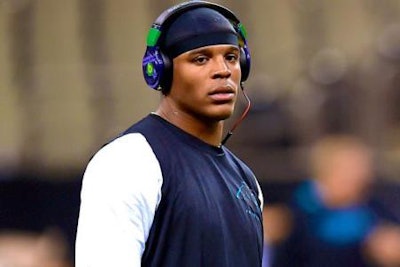 Carolina Panthers quarterback Cam Newton
Carolina Panthers quarterback Cam NewtonThe hype of Super Bowl 50 is well underway, but it began last week with a bold blast of truth from the man of the hour ― a 26-year-old who just graduated in June with a sociology degree from Auburn University.
It was the place where Carolina Panthers quarterback Cam Newton developed into the whole person he has become. A Heisman winner. A leader of a team at football’s most important position with stats making him the potential most valuable player in all the NFL.
A Super Bowl 50 victory would put him up there with legends Joe Namath and Joe Montana as just the third quarterback ever to win both a Super Bowl and an NCAA college championship.
Newton would also be the only one not named Joe and the first named Cameron.
Oh, and he’d be the only African-American.
Anyone have a problem with that? Unfortunately, some still do.
But the public’s feelings are a unique cocktail combined with all sorts of things.
In a society where most people like a little humility from their great ones, the Carolina Panthers star prefers to express himself with a confident exuberance. More hip-hop than in your face. But definitely loud and proud.
Personally, I find it refreshing and welcome. Whatever Newton does, it’s better than reserved and subservient.
And it is a step up and more high-minded from more commonplace jock trash talk.
Newton goes beyond “Your momma” jokes.
In fact, he went back to Auburn and got his degree because of his momma.
And while getting a degree made news last year, he’s making more news this year because, in this season of Carolina Panther dominance, Newton has dared to be his own exclamation mark.
He toots his own horn and some, by dancing, showboating and enjoying the fact that he is better than you.
Great, if you’re a Panthers fan.
But what if you’re not. And what if you’re White?
Is the reaction to Newton a new form of modern-day racism against the Black athlete?
Last week, just to make sure we know what we’re dealing with, Newton made a preemptive strike, and put the world on notice.
“I’m an African-American quarterback; that may scare a lot of people because they haven’t seen nothing that they can compare me to,” said Newton.
Warren Moon? Doug Williams? Russell Wilson? Colin Kaepernick?
He’s right.
They were and are all much more reserved. To the point of relative invisibility.
But, I could think of someone, though in a different sport.
In 1964 in the pre-dawn of the civil rights era, I was just a young boy when I saw another young, gifted African-American athlete in the news. He was slightly younger than Newton, at 22, and smaller, but still a heavyweight. His name was Cassius Clay.
You know him today as Muhammad Ali.
He was about to fight for the championship of the world.
And he had a pre-fight poem:
The next champ of the world, there isn’t a doubt.
This I predict and I know the score,
I’ll be champ of the world in ’64.
When I say three, they’ll go in the third,
So don’t bet against me, I’m a man of my word.
He is the greatest! Yes!
I am the man this poem’s about,
I’ll be champ of the world, there isn’t a doubt.
Here I predict Mr. Liston’s dismemberment,
I’ll hit him so hard; he’ll wonder where October and November went.
When I say two, there’s never a third,
Standin’ against me is completely absurd.
When Cassius says a mouse can outrun a horse,
Don’t ask how; put your money where your mouse is!
I AM THE GREATEST!”
We look back at the young Clay as being at his brash and confident best, a man who knew his greatness.
But at the time, history knows how Clay was treated. America seemed scared of the loud upstart. His braggadocio may seem charming now and a little quaint by today’s standards, but then most saw it as hot air, and few predicted Clay would beat the reigning champ, Sonny Liston.
Clay, a 7-1 underdog, beat him by TKO in the seventh round.
But the backlash was just beginning.
By 1967, Clay converted to Islam and became Muhammad Ali. And that, mixed with his anti-Vietnam War, anti-draft stand, vilified him in society.
He was stripped of his boxing licenses and was unable to fight between 1967 and 1970, essentially his prime.
Ali’s draft evasion case went all the way to the U.S. Supreme Court and was finally overturned in 1971.
By then, most people realized they were wrong about the draft, the war, fighting civil rights and Muhammad Ali.
Cassius Clay at 22? Cam Newton at 26.
If you’re against him, you could be all wet.
Newton’s play this season speaks for itself. His style is his own, but his acknowledgment of his greatness is derivative of a youthful Clay. And the mixed public reaction in this day, unfortunately, only says something about how postracial we still are not.
I see Newton and see the athlete I saw on my black and white TV as a little kid. I always admired that loud poetic upstart named Clay, who could “float like a butterfly, sting like a bee.”
I ain’t betting against this kid named Cam.
Emil Guillermo is an award-winning journalist and commentator who writes at https://www.aaldef.org/blog/ and at www.amok.com















